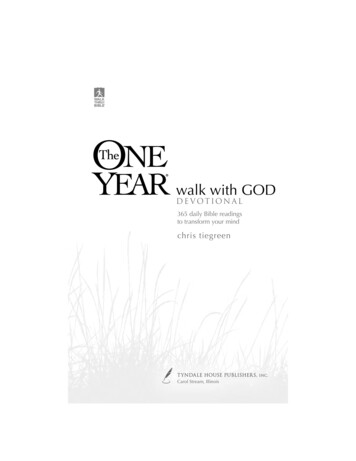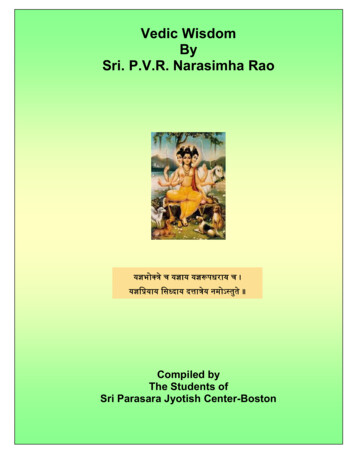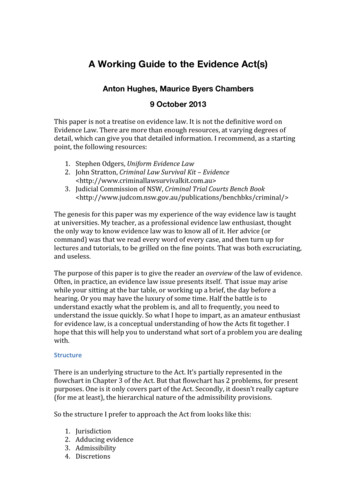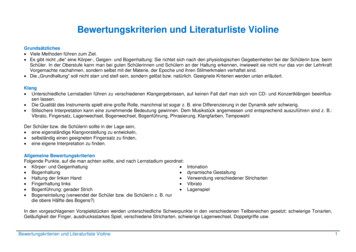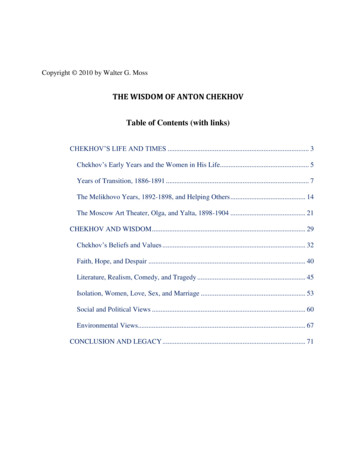
Transcription
Copyright 2010 by Walter G. MossTHE WISDOM OF ANTON CHEKHOVTable of Contents (with links)CHEKHOV‟S LIFE AND TIMES . 3Chekhov‟s Early Years and the Women in His Life. 5Years of Transition, 1886-1891 . 7The Melikhovo Years, 1892-1898, and Helping Others . 14The Moscow Art Theater, Olga, and Yalta, 1898-1904 . 21CHEKHOV AND WISDOM . 29Chekhov‟s Beliefs and Values . 32Faith, Hope, and Despair . 40Literature, Realism, Comedy, and Tragedy . 45Isolation, Women, Love, Sex, and Marriage . 53Social and Political Views . 60Environmental Views. 67CONCLUSION AND LEGACY . 71
2THE WISDOM OF ANTON CHEKHOVIn his novel Life and Fate Vasily Grossman (1905-1964) has one of his characters say that“Chekhov is the bearer of the greatest banner that has been raised in the thousand years ofRussian history—the banner of a true, humane, Russian democracy, of Russian freedom, of thedignity of the Russian man.”1 U. S. filmmaker Woody Allen once said, “I'm crazy aboutChekhov. I never knew anybody that wasn't.”2 To Allen, Chekhov‟s humor was no doubt part ofhis appeal, but perhaps his wisdom, sometime displayed through his humor, was also part of theattraction. This year marks the 150th anniversary of Chekhov‟s birth, and it seems especiallyappropriate to consider that wisdom. It is as relevant today as it was when he died at age 44 oftuberculosis in 1904.His life demonstrates that to be wise one does not have to be old. The writer MaximGorky, who knew Chekhov in his final years, wrote of his “wise smile” and attempted to capturehis approach to his fellow Russians in the following image: “In front of that dreary, gray crowdof helpless people there passed a great, wise, and observant man; he looked at all these drearyinhabitants of his country, and, with a sad smile, with a tone of gentle but deep reproach, withanguish in his face and in his heart, in a beautiful and sincere voice, he said to them: „You livebadly, my friends. It is shameful to live like that.‟”3 Chekhov himself said in 1902 that whenpeople realized how badly they lived, they would “create another and better life for themselves. Iwill not live to see it, but I know that it will be quite different, quite unlike our present life. Andso long as this different life does not exist, I shall go on saying to people again and again,„Please, understand that your life is bad and dreary!‟”4Thus, his implied criticism stemmed from his compassion. It was just one of manywisdom traits he displayed in his personal life, in his work as a doctor, and in his plays andhundreds of stories, which probably influenced the writing of modern drama and short fictionmore than those of any other writer. Commenting on his social and humanitarian activities, onescholar wrote that “his life was one continuous round of alleviating famine, fighting epidemics,building schools and public roads, endowing libraries, helping organize marine biology libraries,giving thousands of needy peasants free medical treatment, planting gardens, helping fledglingwriters get published, raising funds for worthwhile causes, and hundreds of other pursuitsdesigned to help his fellow man and improve the general quality of life around him.”5 Unlikesome Russian intellectuals of his time, Chekhov possessed a practical wisdom that enabled himto care for those he loved and to help others. Perhaps exaggerating only a bit, the poet W. H.Auden once said that “the best Russian writer is Chekhov because he is the only one who has theleast bit of common sense.”61Vasily Grossman, Life and Fate: A Novel, trans. Robert Chandler (New York: Perennial Library, 1987), 283.Woody Allen and Stig Björkman, Woody Allen on Woody Allen, rev. ed. (New York: Grove Press, 2005), 156.3Maxim Gorky, "Anton Chekhov: Fragments of Recollections," http://www.eldritchpress.org/ac/gorky.htm (all websites accessed between May 15 and October 28, 2010).4Quoted in David Magarshack, Chekhov, the Dramatist (New York: Hill and Wang, 1960). 13-14.5Simon Karlinsky, “Introduction: The Gentle Subversive,” in Anton Chekhov, Letters of Anton Chekhov, ed. SimonKarlinsky (New York: Harper & Row, 1973), 26.6Quoted in Ivan Bunin, About Chekhov: The Unfinished Symphony (Evanston: Northwestern University Press,2007), xvii.2
3His love of goodness, beauty, and truth, all of which wise people attempt to integrate intotheir lives, shines through his works. Other wisdom characteristics he manifested were humility,tolerance, self-discipline, creativity, appreciation of both the comic and tragic aspects ofexistence, and hopes for the earth and the people who inhabit it now and in the future. An editorof his letters, wrote, “he was the least doctrinaire, the least dogmatic of men,” and that “hishonesty was equal to his humanity.”7 The psychoanalyst Erik Erikson once stated that the truetest of wisdom was maintaining a positive approach to life in the face of death,8 and Chekhovalso did that. Another friend and fellow writer, Ivan Bunin, wrote that “for fifteen years hesuffered from an exhausting illness [tuberculosis] which finally killed him, but his readers neverknew it. The same could not be said of most writers. Indeed, the manliness with which he borehis sufferings and met his death was admirable. Even at his worst he almost succeeded in hidinghis pain.”9 After first summarizing his brief life and the world he lived in, we shall examine moreclosely his wisdom.CHEKHOV‟S LIFE AND TIMESChekhov lived during a fascinating period of Russian history, and his stories and plays revealmuch about this era. A Soviet scholar once calculated that in all Chekhov‟s works more than8,000 characters appeared.10 The year after his birth in the small Azov Sea town of Taganrog,Tsar Alexander II declared the emancipation of the Russian serfs. They made up about two-fifthsof the Russian population, had been subjects of their serfowners, and were overwhelminglyilliterate. Chekhov‟s paternal grandfather had once been a serf, but was one of a very smallpercentage of them who had bought his freedom. The serf emancipation was part of a largerprogram of economic modernization undertaken by Tsar Alexander II after Russia‟s defeat in theCrimean War (1853-1856).Although convinced that the Russian Empire had to modernize if it wished to remain amajor power, Alexander and the two tsars that followed him were reluctant to give up theirautocratic powers. This was especially true after the emancipation and other reforms awakenedexpectations but then disappointed critics who thought they had not gone far enough. In 1881,while Chekhov was studying medicine at Moscow University, Alexander II was assassinated.7Anton Chekhov, Letters of Anton Chekhov, ed. Avraham Yarmolinsky (New York: Viking Press, 1973), viii. Theoriginal Russian letters can be found in his 12-volume Pisma (accompanied by an index in Vol. 13), which is part ofhisv 30 tomakh (Moscow: Nauka, 1974-83). To increase accessibility toChekhov‟s letters, stories, and plays for English readers, however, I will generally cite English language translationsand, where possible, online versions of them. Unless otherwise indicated, all quotes from Chekhov‟s letters are astranslated by Constance Garnett, at http://www.gutenberg.org/dirs/etext04/ltchk10.txt. On a few occasions I havemade some slight variations in the Garnett translations (of stories as well as letters) that do not change the meaningof the original Russian.8Erik H. Erikson, “Reflections on Dr. Borg's Life Cycle,” in Aging, Death, and the Completion of Being(Philadelphia: University of Pennsylvania Press, 1979), 60.9See Bunin‟s recollections in Maxim Gorky, Alexander Kuprin, and I. A. Bunin, Reminiscences of Anton Chekhov,at http://www.eldritchpress.org/ac/bunin.htm.10Cited in Kenneth A. Lantz, “Chekhov‟s Cast of Characters,” in A Chekhov Companion (Westport: GreenwoodPress, 1985), ed. Toby W. Clyman, 71. More detail on Russia during this period is provided in Walter G. Moss, AHistory of Russia, Vol. 1: To 1917, 2d ed. (London: Anthem Press, 2003). For a recent extensive bibliography ofChekhov, see Peter Henry, ed. Anton Chekhov in English: 1998 2004 2008 (Oxford, Eng.: Northgate Books,2008), at http://www.basees.org.uk/down/Chekhov Bibliography.pdf.
4This led to a more reactionary period of rule under his son Alexander III and his grandsonNicholas II, which lasted for the rest of Chekhov‟s life. The year of his death, 1904,11 marked thebeginning of the Russo-Japanese War, which Russia lost, helping lead to widespreaddisturbances in 1905. These disturbances, in turn, led Nicholas II to make reluctant concessions,which eased some of the earlier reactionary measures. The quarter century of Chekhov‟sadulthood thus coincided almost exactly with one of the most reactionary periods of Russianhistory.Yet, because the tsars wished military strength, Chekhov‟s life also spanned a period ofincreased economic modernization. Compared to the half century before his birth, modernizationindicators like population growth, urbanization, literacy, industrial output, and the size of themiddle class all increased at a more rapid pace. Yet, when compared to Western Europe or theUnited States in 1904, the Russian Empire was still an economically and socially backwardcountry. Four-fifths of its people were still peasants, most of them still poor and illiterate—Chekhov‟s short story “The Peasants” provides a wonderful portrait of their life at the end of thenineteenth century.12 Although Russian factory and handicraft production increased at leasttenfold from 1860 to 1913, factory workers still made up less than two percent of the empire'spopulation by the time of Chekhov‟s death, a percentage close to that of the Russian nobility.Among the European Russian Orthodox population at the end of the 1890s, more than one-fourthof the infants died before their first birthday. A decade later the European Russian death rate forinfants was about twice as high as those born in England and France.The desire of the tsars to maintain their autocratic powers and political stability whilemodernizing for military and other reasons led to all sorts of contrasts and tensions. Theincongruities of such a social order, despite some censorship, provided ample material for awriter like Chekhov who started off as a humorist. Although the serfs were emancipated, most ofthem remained tied to peasant communes. Even if they allowed their peasants to live and work ina city, communes continued to exercise some powers over them. Although still in many ways abackward patriarchal and bureaucratic society, Russia produced writers and composers of worldclass significance. Dostoevsky, Tolstoy, Turgenev, Tchaikovsky, Musorgsky, and RimskyKorsakov were all part of an older generation still working during at least part of Chekhov‟slifetime. Tolstoy, whom Chekhov first met in 1895, and Tchaikovsky, whom he met in 1888,came to know and like the younger Chekhov. By the year of his death the early works ofSymbolist poets like Andrei Bely and Alexander Block appeared, influenced by Chekhov‟scontemporary, the poet, philosopher and mystic Vladimir Soloviev. Soon after Chekhov‟s deaththe modernistic paintings of Kandinsky and music of Stravinsky helped revolutionize modernculture.11Dates here will be according to the Russian (Julian) calendar when referring to events inside the Russian Empirebefore 1917; when referring to Chekhov abroad, Western dates will sometimes be placed in parenthesis after theJulian dates. During Chekhov‟s life the Russian calendar was 12 to 13 days behind the Gregorian calendar used inmost Western countries.12This and almost all of the other Chekhov stories and plays mentioned in this essay can be found online. See, e.g.,“201 Stories by Anton Chekhov,” at http://www.ibiblio.org/eldritch/ac/jr/index.htm. Unless otherwise indicated allquotes from his stories, are from the stories found here as translated by Constance Garnett. See alsohttp://www.online-literature.com/anton chekhov/; ooks; andthe links at http://www.ibiblio.org/eldritch/ac/chekhov.html. A search athttp://www.archive.org/search.php?query chekhov yields 215 Internet results in various media and languages,including Russian.
5The Russian Empire was a vast territory at the time of his birth, and despite sellingAlaska to the United States in 1867, it continued to expand up until his death. By then it wasmore than twice the size of the United States. At the end of the 1890s, ethnic Russians were lessthan half of the population in an empire that contained more than a hundred nationalities, someof whom, like the Jews, the government discriminated against. Some port cities like St.Petersburg and Chekhov‟s hometown, Taganrog, also had significant numbers of foreigners.Chekhov‟s Early Years and the Women in His LifeIn Taganrog Chekhov‟s father, Pavel, ran a small general store, took his Orthodox religionseriously, and was a strong disciplinarian, often whipping or landing blows on the young Anton.Pavel was insistent that his family devote much time to church services, and Anton later told afriend that in reaction to his father he hated any authoritarian attempt to impose one‟s beliefs onothers. Providing for his wife and six children (five of them boys) was not easy for Anton‟sfather, and Anton himself often had to work in his father‟s store. After Pavel went bankrupt inthe mid-1870s, he moved to Moscow where Anton‟s two older brothers, Alexander and Nikolai,were already studying.13 The rest of the family soon joined him except for Anton, who remainedin Taganrog for a few more years to finish his secondary schooling. After joining his family in1879 and enrolling at Moscow University to study medicine, Anton soon became the chiefprovider for his family—his father had a low-paying job at a warehouse, where he usually slept.Anton earned money chiefly by writing all sorts of materials, primarily for popular humormagazines.While still in Taganrog, he had already displayed in some amateur writing and acting asense of humor and an interest in theater. We know little about any plays he wrote in this period,but the title of one of them, Laugh It Off If You Can, is intriguing because for the rest of his shortlife, especially in hundreds of his short stories and in several of his plays, Chekhov used humoras a way of coping with the unpleasantness that he saw all around him.Chekhov‟s letters reveal much about his life. Shortly before leaving Taganrog, he wroteto his younger brother Mikhail (Misha):One thing I don't like: why do you style yourself "your worthless and insignificant brother"? You recognizeyour insignificance? . . . Recognize it before God; perhaps, too, in the presence of beauty, intelligence,nature, but not before men. Among men you must be conscious of your dignity. Why, you are not a rascal,you are an honest man, aren't you? Well, respect yourself as an honest man and know that an honest man isnot something worthless. Don't confound “being humble” with “recognizing one's worthlessness.” . . .It is a good thing that you read. Acquire the habit of doing so. In time you will come to value that habit.Madame Beecher-Stowe [author of UT ’ C] has wrung tears from your eyes? I read her once,and six months ago read her again with the object of studying her. . . . Read “Don Quixote.” It is a finething. It is by Cervantes, who is said to be almost on a level with Shakespeare. I advise my brothers to read—if they haven't already done so—Turgenev's "Hamlet and Don Quixote."Thus, before age twenty, Chekhov had already acquired a sense of the importance of personaldignity and honesty. He also was beginning to display enough maturity so that even though he was13Russian names are transliterated in many different ways, e.g. Nikolai or Nicolay, or sometimes rendered inEnglish, as would be the case if Nikolai were referred to as Nicholas. Here I will attempt to be consistent in mytransliteration of names except I will retain the spellings of modern scholars, translators, and authors when quotingtheir works.
6only the third oldest child he would soon become the most responsible member of his family, his twoolder brothers being especially irresponsible and often drinking too much.In 1885, a year after completing his medical studies, he wrote to an uncle:My medical work is progressing little by little. I go on steadily treating patients. . . . I have a lot of friendsand therefore many patients. Half of them I have to treat for nothing, but the other half pay me three or fiveroubles a visit. . . . I need hardly say I have not made a fortune yet, and it will be a long time before I do,but I live tolerably and need nothing. So long as I am alive and well the position of the family is secure. Ihave bought new furniture, hired a good piano, keep two servants, give little evening parties with musicand singing. I have no debts and do not want to borrow. Till quite recently we used to run an account at thebutcher's and grocer's, but now I have stopped even that, and we pay cash for everything.He also told his uncle that late the preceding year he “had an attack of spitting blood.” As one ofhis chief biographers writes, “Never in the nineteen years that were left to him could he everhave forgotten that his days were numbered.”14By 1885 Chekhov had also already had his share of sexual and romantic encounters,including some visits to Moscow prostitutes. A reviewer of Donald Rayfield‟s excellentbiography of Chekhov makes it clear, however, that he appealed to a wide variety of women.“Tall [six foot one], good-looking and witty, he was a magnet to women from an early age, andthe attraction was mutual—„You have two diseases, amorousness and spitting blood,‟ oneerstwhile lover jokes.”15 In 1886, he was briefly engaged to Dunia Efros, a young strong-willedJewish woman. During the next decade and a half there would be more sexual and romanticencounters. During his roundtrip to and from Sakhalin he described in a letter a pleasantexperience with a Japanese prostitute in the Russian Far East and mentioned her “artful coquetry,accompanied by laughing.”16 On his return from Sakhalin he stopped in Ceylon (now Sri Lanka)and mentioned having his “fill of palm groves and bronze women,” including a rendezvous “witha black-eyed Hindu girl. . . . in a coconut groove, on a moonlit night!”17 In the 1890s there werenumerous women in his life, one of the most notable was a beautiful young blonde named Lydia(Lika) Mizinov. One acquaintance said she was “spellbinding.” Chekhov‟s sister, Masha, threeyears younger than her famous brother and very close to him, wrote that “people could not taketheir eyes off her.”18 In an 1891 letter, he wrote to her that on one occasion, “we greedilydevoured your face and head with our eyes. Ah, Lika, Lika, diabolical beauty!” That same year,he wrote in another letter that “in women I love beauty above all things.”Until the final few years of his life, however, he avoided any long-term commitment.Then, in 1900, he became intimate with the leading actress Olga Knipper and married her the14Donald Rayfield, Understanding Chekhov: A Critical Study of Chekhov's Prose and Drama (Madison: Universityof Wisconsin Press, 1999), 24. See also Rayfield's, Anton Chekhov: A Life (Evanston: Northwestern UniversityPress, 2000).15Clare Cavanagh, “The Passion of Anton,” The New York Times, March 15, 1998, 0315.15cavanat.html. Rayfield, Anton Chekhov, 117-18, quotesthe 1885 letter regarding his “amoursness.”16Anton Chekhov, Anton Chekhov: A Life in Letters, ed. Rosamund Bartlett (London: Penguin Books, 2004), 24344. This edition of Chekhov‟s letters contains some passages that were censored in the Soviet Russian editionmentioned above in fn. 7. The description of his experience with a Japanese prostitute was omitted from the Russiancollections of his letters, but is also given in Rayfield, Anton Chekhov, 228; William Boyd, records the experienceoccurring in a different location in his “A Chekhov Lexicon,” The Guardian, July 3, 2004, sics#article continue.17Chekhov refers to his experience with a “Hindu girl” in his Letters of Anton Chekhov, ed. Karlinsky, 174.18Quoted in Rayfield, Anton Chekhov, 207-08.
7following year. Later on, when dealing with Chekhov‟s wisdom, we shall examine more closelyhis relations with, and attitude toward, women.Years of Transition, 1886-1891Meanwhile, 1886 marked the beginning of an important transition in Chekhov‟s writing. Someof his stories started appearing in the popular newspaper New Times, edited by Alexei Suvorin.He paid more than Chekhov had received for his many earlier humorous stories, allowed hisstories to be longer, and insisted for the first time that Chekhov use his real name and not hisearlier pen names. Soon after his first stories appeared in Suvorin‟s paper early that year,Chekhov received a letter from the highly regarded older writer Dmitri Grigorovich. It praisedthe young writer‟s talents and advised him to take himself and the writing craft more seriously.Chekhov responded with deep gratitude.Your letter, my kind, fervently beloved bringer of good tidings, struck me like a flash of lightning. I almostburst into tears, I was overwhelmed. . . .If I have a gift which one ought to respect, I confess before the pure candour of your heart thathitherto I have not respected it. . . . All my friends and relatives have always taken a condescending tone tomy writing, and never ceased urging me in a friendly way not to give up real work for the sake ofscribbling. I have hundreds of friends in Moscow, and among them a dozen or two writers, but I cannotrecall a single one who reads me or considers me an artist. . . . In the course of the five years that I havebeen knocking about from one newspaper office to another I have had time to assimilate the general viewof my literary insignificance. . . . . . Hitherto my attitude to my literary work has been frivolous, heedless, casual. I don't remembera single story over which I have spent more than twenty-four hours. . . .It is impossible to get out of the rut I have got into. I have nothing against going hungry, as I havedone in the past, but it is not a question of myself. . . . I give to literature my spare time [from hisdoctoring], two or three hours a day and a bit of the night, that is, time which is of no use except for shortthings. In the summer, when I have more time and have fewer expenses, I will start on some serious work. .I rest all my hopes on the future. I am only twenty-six. Perhaps I shall succeed in doing something,though time flies fast.That same month he wrote to his older brother Nikolai a letter that reveals more about hisfeelings towards the necessity of maturing toward a more cultured approach to life.You have only one failing . . . . That is your utter lack of culture. . . . Cultured people must, in my opinion,satisfy the following conditions:1. They respect human personality, and therefore they are always kind, gentle, polite, and ready togive in to others. . . .2. They have sympathy not for beggars and cats alone. . . .3. They respect the property of others, and therefore pay their debts.4. They are sincere, and dread lying like fire. . . .5. They do not disparage themselves to rouse compassion. . . .6. They have no shallow vanity. They do not care for such false diamonds as knowing celebrities. .7. If they have a talent they respect it. They sacrifice to it rest, women, wine, vanity. . . .8. They develop the aesthetic feeling in themselves. They cannot go to sleep in their clothes, seecracks full of bugs on the walls, breathe bad air, walk on a floor that has been spat upon, cooktheir meals over an oil stove. They seek as far as possible to restrain and ennoble the sexual
8instinct. What they want in a woman is not a bed-fellow . . . . . They want especially, if they areartists, freshness, elegance, humanity, the capacity for motherhood. . . . They do not swill vodka atall hours of the day and night.Chekhov viewed the maturing of his siblings and himself as requiring a constant effort toovercome the limitations of the subculture in which they had been raised in order to becomemore cultured individuals. In an 1889 letter that he wrote to Suvorin, we can see what he feltabout his own maturing process.In addition to plenty of material and talent, one wants something else which is no less important. One wantsto be mature—that is one thing; and for another the feeling of personal freedom is essential, and that feelinghas only recently begun to develop in me. I used not to have it before; its place was successfully filled bymy frivolity, carelessness, and lack of respect for my work.What writers belonging to the upper class have received from nature for nothing, plebeians acquireat the cost of their youth. Write a story of how a young man, the son of a serf, who has served in a shop,sung in a choir, been at a high school and a university, who has been brought up to respect everyone ofhigher rank and position, to kiss priests' hands, to reverence other people's ideas, to be thankful for everymorsel of bread, who has been many times whipped, who has trudged from one pupil to another withoutgoloshes, who has been used to fighting, and tormenting animals, who has liked dining with his richrelations, and been hypocritical before God and men from the mere consciousness of his owninsignificance—write how this young man squeezes the slave out of himself, drop by drop, and howwaking one beautiful morning he feels that he has no longer a slave's blood in his veins but a real man's.The encouragement received in early 1886 from Suvorin and Grigorovich soon showedup in his writings. As one Chekhov scholar noted, “there is a discernable change in the stories of1886, which are both more serious and better finished than those which preceded them.”19 Suchstories as “Easter Eve” (1886), “Misery (1886),” and “Enemies” (1887) reflect the more matureChekhov. The 1886-87 years were incredibly productive ones for Chekhov, with many of hisstories not only being more serious, but also longer than the mainly humorous ones that cameearlier. One Chekhov scholar estimates that by March 1888, Chekhov “had published anincredible 528 stories, about half of them comic,” but that from 1888 until his death in 1904 only60 stories were forthcoming.” Most of these later stories also contained less humor than the onesof his early years, but one of his finest late short stories, “The Darling” (1899) Chekhov himselfconsidered humorous, and we shall return to it later.20The year 1887 also marked Chekhov‟s emergence as a writer of plays, an exercise untilthen he had engaged in only sporadically. His Ivanov opened in Moscow late that year andstirred considerable debate. Although he also wrote the less successful The Wood Demon duringthe next few years and some shorter plays between 1885 and 1891, his best plays were producedat the end of his life. Although his shorter plays were comedies, the longer ones contained bothcomic and tragic elements.By the end of 1888 Chekhov, not yet thirty, was already recognized as a major writer. Hereceived that year‟s Academy of Sciences‟ Pushkin Prize for literature for a recent collection ofhis stories published by Suvorin, who would also publish additional collections of them insubsequent years. Besides new short stories written that year, two of his most popular one-actfarces, The Bear and The Proposal, also appeared.21 In addition, his long story (over one hundred19Beverly Hahn, Chekhov: A Study of the Major Stories and Plays (London: Cambridge University Press, 1977), 55.Some of his comic stories, including “The Darling,” have been collected in Anton Chekhov, Chekhov, the ComicStories, trans. Harvey Pitcher (Chicago: Ivan R. Dee, 1999).21See htm for some of Chekhov‟s one-act plays.20
9pages) “The Steppe” was published in an important literary journal, The Northern Herald. Hehad gathered material for the tale, as well as a few other stories, on a trip back to Taganrog andthe nearby steppe the previous year.Despite his newfound fame, he did not abandon medicine, though he made little moneyfrom it. As he wrote to Suvorin in September 1888, “I feel more confident and more satisfiedwith myself when I reflect that I have two professions and not one. Medicine is my lawful wifeand literature is my mistress. When I get tired of one I spend the night with the other. Though it'sdisorderly, it's not so dull, and besides neither of them loses anything from my infidelity. If I didnot have my medical work I doubt if I could have given my leisure and my spare thoughts toliterature.”Although living with family members mainly in Moscow during these years, he madeoccasional trips to other parts of the vast Russian Empire and abroad and often spent summers inthe countryside. In the mid 1880s for three years, Chekho
2 THE WISDOM OF ANTON CHEKHOV In his novel Life and Fate Vasily Grossman (1905-1964) has one of his characters say that “Chekhov is the bearer of the greatest banner that has been raised in the thousand years of Russian history—the banner of a tr
